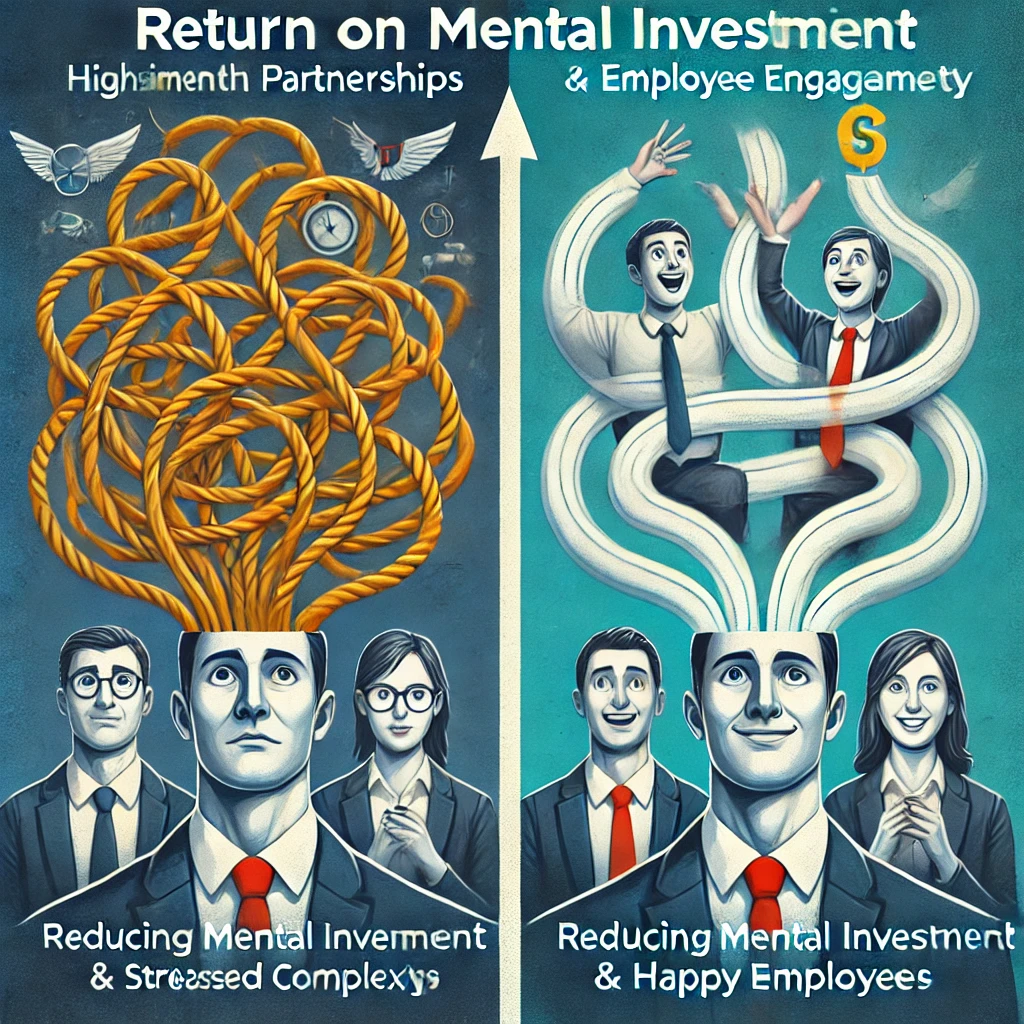Business operations today are becoming increasingly complex, and one of the hidden drivers of these complexities is what I call mental investment. This term refers to the emotional and psychological burden that stakeholders — be they employees, business partners, or customers — invest when working with a company. Reducing this mental investment can lead to lower business costs, enhanced collaboration, and increased profitability. The Return on Mental Investment (RMI) theory, developed through the Unified Theory of Emotions, provides practical ways for companies to reduce these hidden costs, streamline operations, and foster emotionally engaged stakeholders.
What is Mental Investment?
Mental investment is the emotional and intellectual effort that individuals expend when engaging with a business. This includes the energy they use to understand their role, predict the company’s future, handle uncertainties, and manage emotional stress. When employees or partners invest too much mentally without receiving a clear return, they are more likely to expect higher compensation, better contract terms, or even disengage from the company altogether.
In contrast, when a business can reduce the mental burden it places on stakeholders, it can expect lower demands in terms of risk premiums. This translates to reduced operational costs, better productivity, and stronger relationships with employees, partners, and customers.
Reducing Mental Investment Through Emotional Engagement
The Unified Theory of Emotions posits that emotional engagement can significantly lower the mental investment required by stakeholders. Here’s how:
- Building Trust and Transparency: When employees and business partners trust the company’s direction and feel confident in its future, they expend less mental energy worrying about potential risks. Transparent communication about the company’s goals and challenges reassures stakeholders, making them feel secure in their decisions and reducing the emotional burden of uncertainty.
- Consistency in Leadership and Operations: Inconsistent policies or unclear leadership direction can cause significant mental strain on employees and business partners. By maintaining consistency in operations and decision-making, companies reduce the need for stakeholders to second-guess their actions or worry about sudden changes. This predictability lowers the mental investment required to remain engaged with the company.
- Emotional Support and Engagement: Leaders who foster emotional connections with their teams create environments where employees feel valued, heard, and emotionally invested in the company’s success. This type of emotional engagement not only reduces mental stress but also leads to increased loyalty and long-term commitment. Employees are more likely to stay engaged and productive when they feel emotionally connected to the company’s goals and values.
How RMI Reduces Costs
The Return on Mental Investment (RMI) framework shows that reducing mental investment can have tangible benefits for a company’s bottom line. Here’s how:
- Lower Compensation Demands: When employees or partners feel emotionally engaged and less mentally burdened, they are more likely to accept lower compensation or contract terms. This is because their emotional return, in the form of job satisfaction, stability, and trust, offsets the need for higher financial returns.
- Reduced Turnover: Employees who are emotionally invested in their work are less likely to leave, reducing the costs associated with hiring and training new staff. A lower mental investment means employees feel more at ease, more secure, and more satisfied, which translates to better retention rates.
- Improved Productivity: Emotionally engaged employees are more focused and productive. They expend less mental energy managing stress and uncertainties, allowing them to concentrate fully on their work. The reduction in mental investment directly correlates to better output and performance.
Strategies to Implement RMI in Business
To implement the Return on Mental Investment (RMI) strategy, companies need to address the emotional and psychological factors that contribute to mental investment. Here are key steps businesses can take:
- Foster Emotional Engagement: Leaders should actively work to build emotional connections with their teams by offering recognition, empathy, and support. This emotional investment reduces the need for high financial compensation, as employees feel emotionally rewarded and fulfilled.
- Ensure Consistent Communication: Regularly updating employees and partners on the company’s goals, challenges, and long-term vision helps reduce uncertainty and reassures stakeholders. Consistent communication reduces the mental burden of second-guessing and encourages stakeholders to focus on their work or collaboration.
- Simplify Processes: Unnecessary complexity in business operations can create mental overload for employees and partners. Simplifying workflows, decision-making processes, and communication channels reduces the cognitive load and allows stakeholders to engage with less mental effort.
- Build Trust Through Transparency: A lack of transparency can cause stakeholders to mentally prepare for various worst-case scenarios. By fostering a culture of openness and honesty, businesses can reduce mental investment by eliminating the emotional toll of uncertainty.
Conclusion: Maximizing Return by Minimizing Mental Investment
The Unified Theory of Emotions and the Return on Mental Investment (RMI) framework offer a powerful tool for businesses looking to reduce costs and improve stakeholder engagement. By addressing the emotional and psychological burden placed on employees and partners, companies can lower compensation demands, reduce turnover, and increase productivity. Understanding and reducing mental investment should be a top priority for businesses that seek long-term success in an increasingly complex world. The less mental investment stakeholders are required to make, the higher the return for everyone involved.
